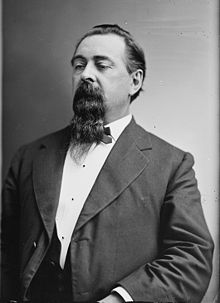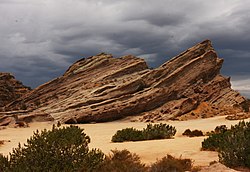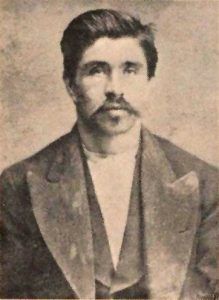
Pacheco

Vasquez
Born on April 11, 1835 in Monterey, Alta California, Mexico to Jose Hermenegildo Vasquez and Maria Guadalupe Cantua. Roots deep in what will become the state of California, his great-grandfather is a member of the 1776 colonization expedition of Spanish explorer Juan Bautista de Anza (approved by the King of Spain). Growing into manhood, Vasquez is a lean 5'7" educated vaquero that can speak both English and Spanish fluently, plays the guitar, writes poetry, reads romance fiction, and loves the local senoritas (which will contribute to his eventual downfall), but falls under the dark influence of his older cousin, bandit Anastacio Garcia ( a supposed former rider with the notorious California desperado Joaquin Murietta). Sparking the ladies at an 1852 fandango, the seventeen-year-old is present when a drunken midnight brawl breaks out that results in the gun death of Constable William Hardmount (over who has the next dance with a particularly beautiful senorita), shot in the head. Believing he will be hung for the killing of the "Americano" lawman (which is the fate of Vasquez friend, Jose Higuerra, who doesn't fire any bullets in the melee, but is hung anyway when he doesn't flee), Vasquez flees the dance and goes into hiding with his bandit cousin ... and soon, Vasquez is a bandit too (and for the rest of his life he will justify his crimes as retaliation for the 'whites' of California discriminating against the region's Spanish and Mexican citizens). Starting out as a hired gun in Monterey County's murderous Roach-Belcher feud (over control of $90,000 in gold and a huge ranching operation on 49,000 acres of land), Vasquez is a horse rustler when he is caught red-handed with a recently stolen herd near Newhall and sent to San Quentin Prison. Reformed in no way, while he spends five years behind bars, Vasquez participates in four escape attempts that leave over twenty convicts dead.
Early San Quentin
Eventually released, Vasquez expands his criminal resume, adding cattle theft, burglary, and armed robbery to his list of known outrages against law-and-order (his "trademark" is binding his victim's hands behind their backs and leaving them face down in the dust at the scene of the crime). During this period, he is also gravely wounded in a Monterey fight with Abelardo Salazar's over Salazar's wife. Caught again after burglarizing a Petaluma store, he is sent back to San Quentin for three more years. Out again in 1870, Vasquez becomes the leader of a band of desperadoes that includes the notorious Juan Soto (known as the Human Wildcat) and Procopio Bustamente (aka "Red Dick"). Robbing the Visalia stagecoach between San Jose and Pacheco Pass, Vasquez is wounded in a gunfight with Sheriff Charles Lincoln, but manages to escape from the posse seeking him and gains his Cantua Creek hideout. Recovered from his wounds, Vasquez leads his men on a raid of the small town of Tres Pinos (now the town of Paicines in San Benito County) ... though the raid gains the outlaws watches, clothing, saddles, new mounts, and roughly $2,200 in cash, it also results in the deaths of three citizens; teamster George Redford is killed fleeing the bandits robbing the Synder General Store, Bernal Berhuri, a Portuguese sheepherder who speaks no English is gunned down in the street for failing to heed the "hands up" order he is given, and Leander Davidson, proprietor of the local hotel, is shot down in the lobby of his establishment when he tries to lock the front door (some have Vasquez killing two of the three men, but the outlaw will later claim he fires no shots in the raid). State outraged, posses crisscross the state seeking Vasquez and his men, Governor Newton Booth places a bounty of $1,000 on the head of the outlaw, while the state legislature allocates $5,000 for the man's capture (the reward money will grow even higher in tally as frustration builds over the authorities inability to stop Vasquez), and the famous lawman, Alameda County Sheriff Harry Morse, is specifically assigned to bring in Vasquez (known as the "bloodhound of the Far West" he helps end the career of stagecoach pirate, Black Bart).
Soto
Bustamente
Moving his base of operations to Southern California where he is not as infamous as in Monterey (one hideout in the Sierra Pelonia Mountains of northern Los Angeles County, a maze of caves, deep crevices, and overhangs is known today as the Vasquez Rocks), and sheltered by the Mexican-American community of the region, the outlaw participates in the robbery of the Jones Store of Millerton in Fresno County, the sacking of the Fresno County town of Kingston (the bandits ride off with over $2,500 in cash and jewelry after controlling the town and its residents for three hours), the robbery of a stagecoach carrying silver from the Cerro Gordo Mines near Owens Lake (Vasquez wounds a man for not following orders quickly enough), robs another stage of $300, six horses, and a wagon near the town of Acton, and kidnaps prominent sheepman, Alessandro Repetto, for ransom. As with so many other criminals over history, the outlaws final undoing comes because of Vasquez's love of the ladies.
Vasquez

Vasquez Rocks
Sleeping with married women not a problem for the outlaw thus far, Vasquez's first mistake is
getting caught screwing the voluptuous wife of gang member Abdon Leiva (gun play avoided, Leiva is allowed to leave the gang and goes straight to the sheriff of the first town he enters and turns into a state witness against Vasquez for the Tres Pinos murders). His second mistake involves living in the adobe home of Yiorges "Greek George"Caralambo (also known as George Allen, he is a former camel driver for the Army Camel Corps of General Edward Beale) in the northwestern corner of Rancho La Brea (located about 200 hundred yards from the present-day Sunset Strip in West Hollywood) while he plans his gang's next job ... a hideout picked because it allows the outlaw easy access to Caralambo's pretty girlfriend. Whether betrayed by the family of the girl, Caralambo, or Caralambo's wife, someone sends a note to Los Angeles Sheriff William R. Rowland that the outlaw is in town and a posse is soon organized to arrest Vasquez.

Leiva
Greek George

The Hideout
Creeping up on Caralambo's home in the back of a large wagon driven by a pair of local Mexican-Americans, the posse surrounds the structure, then breaks in on the outlaw being served a breakfast of fried eggs, tortillas, and freshly brewed coffee. Unwilling to being taken easily, after Constable Sam Bryant breaks down the adobe's wooden door with a hatchet, Deputy Sheriff Emil Harris wounds the outlaw in the chest as he crashes out of the trap through a window, San Francisco Chronicle reporter George Beers (there to cover the story he then participates in) puts a bullet in the fleeing bandit's shoulder, and Police Chief B. F. Hartley finally stops Vasquez with a load of buckshot. Captured, Vasquez is kept in a Los Angeles jail for nine days, then moved by steamship up the coast to San Francisco, before being transferred to San Jose where he stands trial. Behind bars, Vasquez admits he is an outlaw, claims his efforts were in the cause of returning California to Mexico, and claims to have killed no one at Tres Pinos. A celebrity to the state's Hispanic population, Vasquez spends much of his time signing autographs and posing for pictures, which he sells from the window of his cell to pay for his legal fees. Despite the support of many of his fans, his trial is a slam dunk that takes only four days, and the jury returns a death sentence for the bandit after only two hours of deliberations. Walking to his own execution flanked by a shotgun holding officer and a priest, the outlaw is hung on 3/19/1875 by Santa Clara Sheriff John H. Asams shortly after 1:30 in the afternoon ... the only word he speaks from the gallows is "pronto."

San Jose Gallows
Buried at the old Santa Clara Mission, Vasquez remains a touchstone for California Hispanics. Despite being a confessed outlaw, there are now geographical California features named after him ... the previously noted Vasquez Rocks, Vasquez Canyon in Saugus, Vasquez Tree in Morgan Hill, a day-use area named for Vasquez in the Angeles National Forest, and two climbing routes, Tiburcio X and Vasquez's Monolith, in the Pinnacles National Park. Additionally, there is a Vasquez High School in the town of Acton and two Tiburcio Vasquez Health Centers in the towns of Hayward and Union City. And wisely renamed Monte Bella Elementary in 2016 ... the Alisal Union School District near Salinas decides that their new school will change its 2012 name, garnering much criticism for actually okaying a place for educating yoiungsters to be called Tiburcio Vasquez Elementary School. Buried over a century ago, his final resting place is a site where gifts are still left for the deceased bandit and crazy women kiss his tombstone in admiration.

Final Resting Place
Vasquez
No comments:
Post a Comment